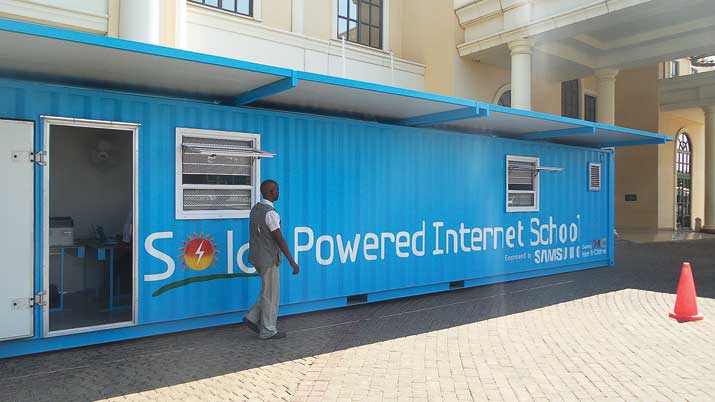Technology giants, Samsung Electronics have ventured into providing solar solutions to Africa’s power needs. The company have created a whole range of solar initiatives that could go a long way in providing access to electricity to rural communities around the continent.
Samsung brought their whole range of solar solutions to this year’s Africa Innovation 2013 held at the Gaborone International Convention Centre last week. A solar powered school, a full medical unit and an independent solar generator were on display with the the school and telemedicine units both housed in normal sized shipping containers which have been custom built for the purpose.
According to Samsung’s Corporate Affairs Lead, Ntutule Tsenye, the research team paid specific attention to solutions which are cost-effective, mobile, easy to set up, and which are suited to the harsh climatic conditions of Africa. He said Samsung have developed a complete solar digital solution for both rural villages without power, and urban neighbourhoods that are subjected to fluctuating electricity supply.
Thierry Boulanger, Director of IT Solutions and B2B said the tele-medical centre offers a quick and accurate diagnoses, a health centre for the treatment of basic illnesses, and basic lighting. The focus is on harnessing the energy of the sun to minimise running costs. He said all products are developed in such a way that they will be maintained at low costs and with extended life-cycles.
“The Solar Powered Internet School, which has been developed for some time is ideal to address educational challenges on the continent,” said Boulanger. The containers are fitted with rubberised solar panels, as glass panels are said to susceptible to easy damage. He further said “the server in each internet classroom contains the complete country-specific school curriculum spanning.” He said full training will be provided for teachers and instructors to ensure that the units can be used to their full potential.
He further explained that the Solar Power generator can be readily adapted to suit the needs of small businesses. The generator is an ideal solution for homeowners, small businesses, remote border posts and schools. Traditional diesel generators, unlike that of the Solar Power generator, utilise non-renewable resources and pollute the environment with fumes and noise, thus making it an environmentally friendly investment, according to Boulanger.
Samsung is drumming up interest in African governments, investing in this kind of technology to mitigate their electricity and outreach constraints. The school is said to cost around US$ 95, 000 (close to P700, 000), while the tele-medical unit would be around US$160 000 (around P1.2 million).

